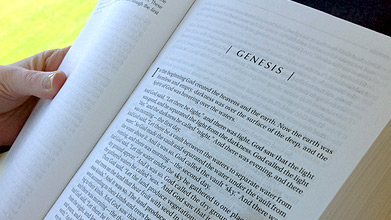How would you define your relationship with the Bible? Is the Bible meeting your expectations? Is it encouraging you, strengthening you, nourishing you? Followers of Jesus have been promised all these and more, but instead, an increasing majority of us come away from our times “in the Word” frustrated, bored, and disconnected with God. Though we say we love the Bible, if we’re honest, our relationship with the Bible isn’t doing so well.
What if we don’t really love the Bible because we don’t really know the Bible? Or rather, what if the Bible we know isn’t what the Bible was inspired to be?
Instead, God’s Spirit inspired people to write and gather together a collection of whole books of different kinds of writing: songs and proverbs, letters and stories. Each of these books contribute to the ongoing narrative of God’s beautiful restoration of his creation. Here’s what I mean: Anyone who has a Bible today has a modern reference edition, probably in two columns per page, with chapter and verse numbers, cross-references, and even study notes. But for the vast majority of its history, the Bible didn’t look this way. The verse numbers we know and use today, for example, didn’t even get added until 1551!
Anyone who has a Bible today has a modern reference edition, probably in two columns per page, with chapter and verse numbers, cross-references, and even study notes. But for the vast majority of its history, the Bible didn’t look this way. The verse numbers we know and use today, for example, didn’t even get added until 1551!
The Bible was not inspired as a dictionary, encyclopedia, or how-to manual. But that’s exactly how we’ve been trained to encounter it. As our Bibles have come to look like reference tools, we have come to read and use the Bible as a reference tool. Form and content inevitably go together.
C. S. Lewis once said that our first responsibility regarding any piece of literature is to follow where it would lead. We are obligated to receive the submitted writing on the author’s terms before we take over with our own attempts to use it on ours.1 In other words, when we come to a given text we must first stifle ourselves by keeping our own questions, concerns, and inner voices from overruling what it is we’re first of all supposed to receive.
But when we come to the Bible we are sorely tempted to get things backwards, to begin with our demands for immediate and obvious relevance on terms that we dictate. We’ve built a chapter and verse Bible designed for doing things we want to do rather than accepting the Bible on its own terms. Our well-intentioned biblical devotion too often has led to merely using the Bible with our agenda already in place.
But what would happen if we started reading and using the Bible as the collection of books it actually is? What if we fell in love with our sacred writings in a whole new way? What if we can know the Bible best when what we bring to it is our love for it—not as we have made it—but as it is?
N. T. Wright observes:
To know is to be in a relation with the known, which means that the ‘knower’ must be open to the possibility of the ‘known’ being other than had been expected or even desired, and must be prepared to respond accordingly, not merely to observe from a distance.2
We need a love that is truly and fully open to something coming to us from outside the imaginings of our own minds and hearts, something than can illumine our world and our stories. Instead of remaking the Bible in our own image, we need to be open to discovering in our sacred book things we had not seen, had not known, had not expected. We need to, in other words, love the Scriptures as something bigger than and other than ourselves.
When we bring this kind of love to the Bible, we will be able to see the mighty drama it reveals. When we bring this kind of love to the Bible, we will find ourselves falling in love—not just with the thing itself—but with the one who stands behind it, who woos us into his story and ultimately to himself.
Adapted from Saving the Bible from Ourselves by Glenn R. Paauw. Copyright © 2016 by Glenn R. Paauw. Used by permission of InterVarsity Press, P.O. Box 1400, Downers Grove, IL 60515-1426.
1 C. S. Lewis, An Experiment in Criticism (Cambridge: Cambridge University Press, 1961), 88-94.
2 N. T. Wright, The New Testament and the People of God (Minneapolis: Fortress Press, 1992), 45.
